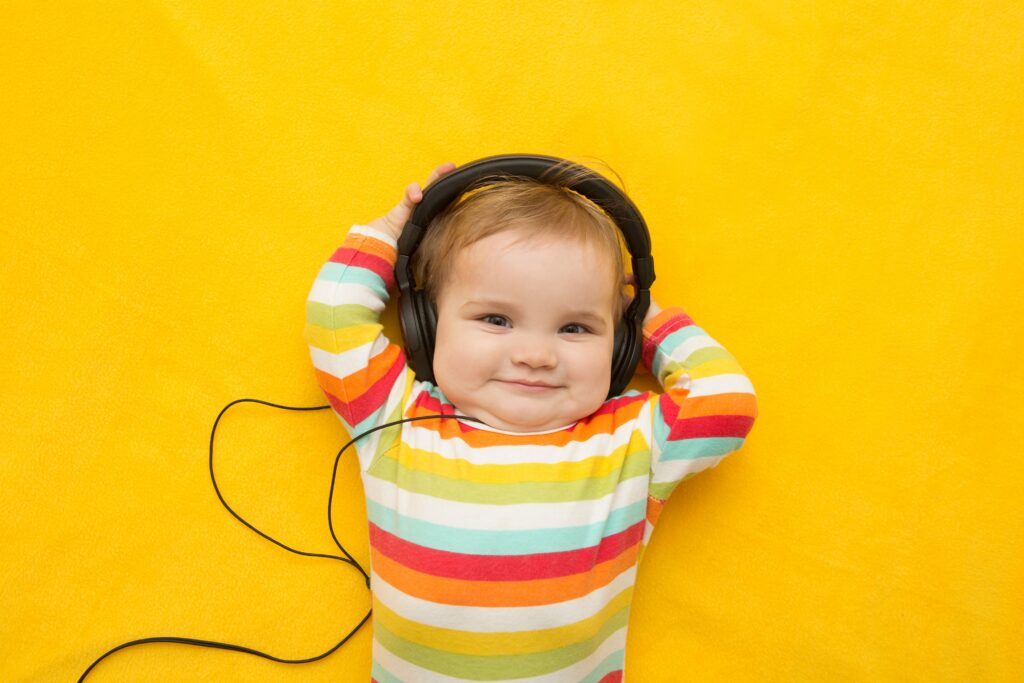With the rapid development of technology and medicine, a wealth of research has provided us with a better understanding of how the brains of young infants work. The scientific community is also actively engaged in empirically identifying factors that help babies grow cognitively and emotionally.

“An overview of the past scientific literature shows that music has a wide range of effects on brain function, including auditory perception, language comprehension and expression, attention, memory, emotion, and physical coordination.”
Music can stimulate both sides of the brain simultaneously
When a person listens to music, the hippocampus and amygdala, which process memory and emotion, is activated in addition to the temporal lobe, which processes sound. Some scholars have pointed out that when listening to a song, the human brain can immediately distinguish the lyrics from the melody of the song. The left brain understands the lyrics, and the right brain understands the melody of the song.
We often hear the term “left brain development” or “right brain development”, but in fact, this is not correct. Each area of the brain performs its own role, and attention should be paid to the connection of the left and right brain. The infant brain begins to develop before birth, gradually establishing important “links” to efficiently grow and quickly connect brain cells. Continuous stimulation such as listening to music, humming, or holding the baby in your arms and doing simple rocking movements, helps the baby’s whole brain connect more actively and produce better connections, which in turn allows the baby to develop more cognitive functions [1].
About music and emotions
At two to six months of age, babies begin to understand emotions by observing how adults react when they tease (e.g., make funny faces or noises), smile or shout. A study by a team of researchers from the University of Geneva in Switzerland, published in the journal Frontiers in Psychology in 2019, found that listening to music in the NICU significantly enhanced the brain development of preterm infants. The team studied three groups of children over a long period of time: full-term birth group, preterm group that listens to music, and a preterm group that does not listen to music.. After conducting mood and comprehension assessments at one and two years of age, they found positive long-term effects on mood in the preterm group that listens to music [2]. The research team also suggested that music plays a role in relieving physical stress, anxiety, and pain in preterm newborns, and also has a positive impact on the long-term brain development of preterm children.

The Mozart effect is a beautiful misconception
Through rigorous experimental design and long-term tracking of children’s cognitive and emotional growth, many recent studies have shown that music plays a beneficial role in the development of infants and young children. You may have heard of the “Mozart Effect”, a study of 36 college students in the United States in 1993, but more than 15 similar studies since then have failed to prove that Mozart’s music can make people become intelligent.
About musical activities that help children’s development
People will have different brain activity and different feelings about different genres of music, and so will babies. Although listening to Mozart’s music does not necessarily make babies smarter, listening to music or interacting with music can still help their cognitive senses. For example, when an adult hums a lullaby and rocks a baby, it can stimulate early language development and increase attachment. Because children can experience body movement, music provides a sense of security and helps babies increase their spatial awareness.
Music plays an important role in the lives of young children and can encourage each child to explore the world in a rich and fun way.
Extended Reading / References
Lejeune, Fleur, Lara Lordier, Marie P. Pittet, Lucie Schoenhals, Didier Grandjean, Petra S. Hüppi, and others, ‘Effects of an Early Postnatal Music Intervention on Cognitive and Emotional Development in Preterm Children at 12 and 24 Months: Preliminary Findings’, Frontiers in Psychology, 10 (2019) <https://www.frontiersin.org/articles/10.3389/fpsyg.2019.00494>
Lordier, Lara, Djalel-Eddine Meskaldji, Frédéric Grouiller, Marie P. Pittet, Andreas Vollenweider, Lana Vasung, and others, ‘Music in Premature Infants Enhances High-Level Cognitive Brain Networks’, Proceedings of the National Academy of Sciences, 116.24 (2019), 12103–8 <https://doi.org/10.1073/pnas.1817536116>
[1] Lara Lordier and others, ‘Music in Premature Infants Enhances High-Level Cognitive Brain Networks’, Proceedings of the National Academy of Sciences, 116.24 (2019), 12103–8 <https://doi.org/10.1073/pnas.1817536116>.
[2] Fleur Lejeune and others, ‘Effects of an Early Postnatal Music Intervention on Cognitive and Emotional Development in Preterm Children at 12 and 24 Months: Preliminary Findings’, Frontiers in Psychology, 10 (2019) <https://www.frontiersin.org/articles/10.3389/fpsyg.2019.00494>.